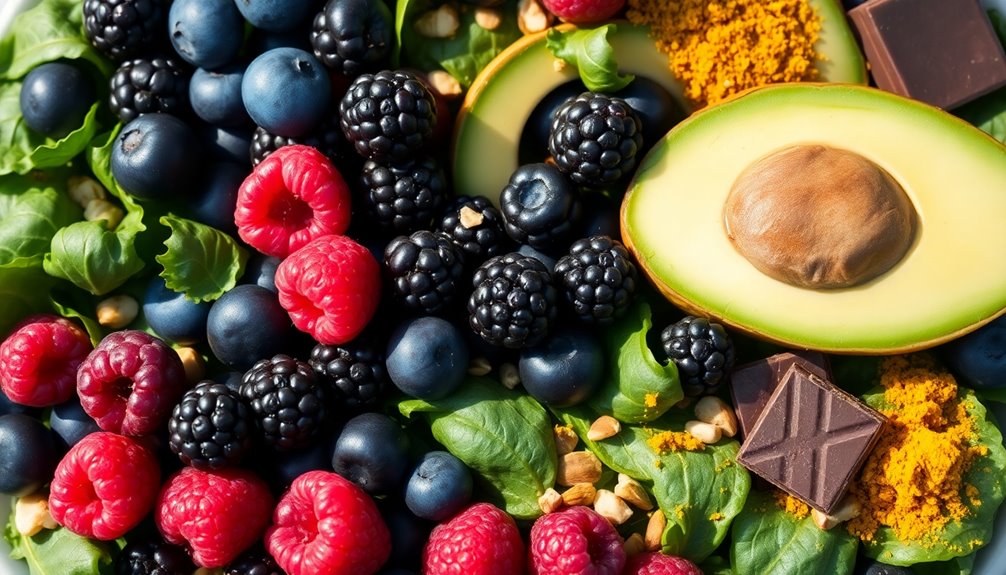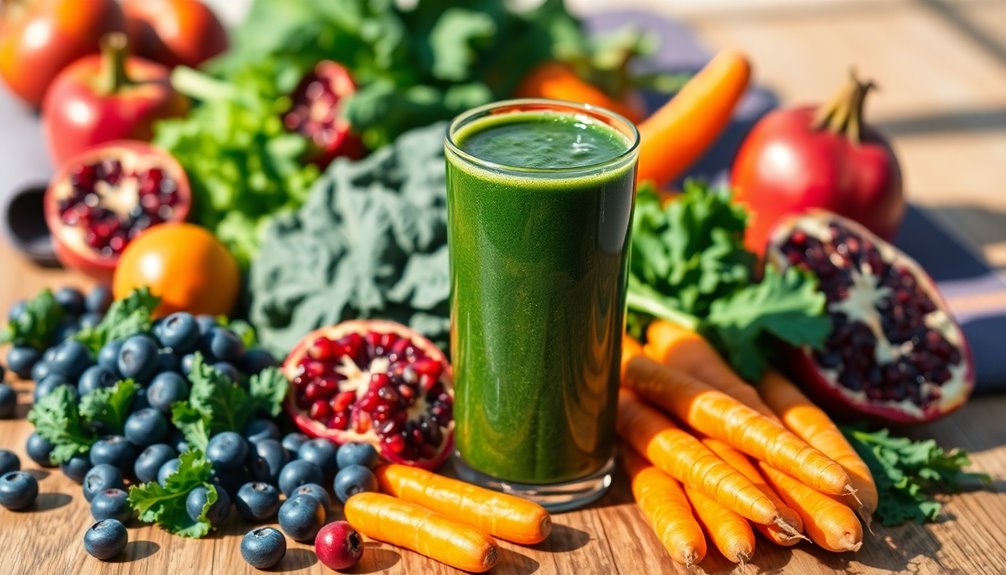Antioxidants play an essential role in fighting inflammation by neutralizing free radicals and reducing oxidative stress in your body. Chronic inflammation can lead to various diseases, but antioxidants help mitigate this risk. They act by modulating cellular signaling pathways and supporting your immune health. Common antioxidant sources include fruits, vegetables, nuts, and whole grains. For instance, Vitamins C and E, along with curcumin and selenium, are effective options. Incorporating these into your diet not only combats inflammation but also promotes overall wellness. As you explore further, you'll discover more about how these nutrients can enhance your health.
Key Takeaways
- Antioxidants neutralize free radicals, reducing oxidative stress that contributes to chronic inflammation and related diseases.
- They support cellular health by modulating immune responses and inflammatory signaling pathways.
- Dietary antioxidants from fruits, vegetables, and nuts help lower inflammation and promote overall well-being.
- Regular intake of antioxidants is associated with lower risks of cardiovascular diseases and improved skin health.
- Lifestyle changes, including balanced nutrition and physical activity, enhance the effectiveness of antioxidants in combating inflammation.
Understanding Inflammation

Inflammation is your body's natural response to injury or infection, acting as a defense mechanism that signals the immune system to protect and heal. This inflammatory response involves complex interactions among immune cells, blood vessels, and various signaling molecules. When you experience an injury, your body releases chemicals like histamines and cytokines. These substances increase blood flow to the affected area, bringing necessary nutrients and immune cells to fight off pathogens and begin the healing process.
However, it's important to understand that inflammation isn't always beneficial. Chronic inflammation can lead to various health issues, including autoimmune diseases, heart disease, and even cancer. As a result, inflammation regulation plays a significant role in maintaining your overall health. Your body has built-in mechanisms to regulate this response, such as anti-inflammatory cytokines and various hormones that help restore balance after an acute inflammatory episode.
Factors like diet, exercise, and stress management can influence how effectively your body regulates inflammation. Consuming a balanced diet rich in fruits, vegetables, and omega-3 fatty acids can provide necessary nutrients that support your immune function and help combat chronic inflammation. Additionally, engaging in regular physical activity can enhance your body's ability to regulate inflammation by promoting better circulation and reducing stress. Moreover, cutting out oxidized fats can significantly aid in reducing inflammation and improving overall health.
What Are Antioxidants?

Antioxidants play an important role in protecting your body from oxidative stress, a condition that occurs when there's an imbalance between free radicals and antioxidants. Free radicals are unstable molecules that can damage cells, leading to chronic inflammation and various health issues. Antioxidants neutralize these free radicals, helping to maintain cellular health and reduce inflammation.
You can find antioxidants in a variety of foods, making it easier to incorporate them into your diet. Common antioxidant sources include fruits like berries, citrus, and apples, as well as vegetables such as spinach, kale, and broccoli. Nuts, seeds, and whole grains also provide significant amounts of these protective compounds.
Additionally, beverages like green tea and red wine contribute to your antioxidant intake, offering both flavor and health benefits.
The significance of antioxidants for inflammation prevention can't be overstated. Research suggests that a diet rich in antioxidants can help lower the risk of inflammatory diseases, such as arthritis and heart disease. By consuming a range of antioxidant sources, you not only support your immune system but also promote overall well-being. Furthermore, adopting a plant-based diet has been shown to enhance your intake of antioxidants, providing a delicious way to boost your health.
In a world where stressors abound, understanding the role of antioxidants empowers you to make informed dietary choices. By prioritizing antioxidant-rich foods, you can enhance your body's defense mechanisms and foster a healthier, more balanced life. Remember, every small step counts in the journey towards better health, and embracing these nutrients can be a crucial part of that process.
Mechanism of Action

The way antioxidants work in the body is essential to understanding their role in combating inflammation. When you consume antioxidants, they engage in complex biochemical interactions that enhance antioxidant pathways. These pathways are crucial because they help neutralize free radicals—unstable molecules that can trigger an inflammatory response. By mitigating oxidative stress, antioxidants play a key role in maintaining cellular health and reducing chronic inflammation.
Here's a brief overview of how antioxidants function:
| Mechanism | Role in Inflammation | Examples |
|---|---|---|
| Free Radical Scavenging | Neutralizes harmful free radicals, decreasing inflammation | Vitamin C, Vitamin E |
| Modulation of Signaling | Influences cellular signaling pathways that regulate inflammation | Resveratrol, Curcumin |
| Gene Expression | Affects the expression of genes involved in the inflammatory response | Glutathione, Selenium |
When antioxidants scavenge free radicals, they prevent cellular damage that contributes to chronic inflammation. This is particularly important in conditions like arthritis and cardiovascular diseases, where inflammation is a driving factor. Additionally, antioxidants can modulate cellular signaling, promoting protective mechanisms that further dampen the inflammatory response. By understanding these mechanisms, you gain insight into how antioxidants can be a valuable part of your wellness strategy, fostering a sense of belonging to a community focused on health and well-being. Incorporating a custom keto diet plan can also enhance the intake of antioxidants, supporting overall health.
Types of Antioxidants

A diverse variety of antioxidants exists, each providing unique benefits in the fight against inflammation. You'll find these substances broadly categorized into two main types: endogenous and exogenous.
Endogenous antioxidants are those your body produces naturally, such as glutathione and superoxide dismutase. They play a vital role in neutralizing free radicals and reducing oxidative stress.
On the other hand, exogenous antioxidants come from external sources, including various foods and antioxidant supplements.
Fruits and vegetables, rich in vitamins C and E, carotenoids, and flavonoids, serve as excellent antioxidant sources. These compounds work together to combat inflammation and enhance overall health. However, it's often challenging to obtain sufficient amounts of these antioxidants through diet alone, especially if your lifestyle is busy or your dietary preferences are limited. Additionally, certain dietary choices, such as avoiding traditional bread, can further support your body's antioxidant defenses.
This is where antioxidant supplements can play a part. They offer concentrated doses of necessary antioxidants, making it easier to achieve the desired intake. Popular options include vitamin C, vitamin E, selenium, and coenzyme Q10. When considering supplements, it's important to choose high-quality products and consult with a healthcare professional to make sure they align with your individual needs.
Ultimately, understanding the types of antioxidants and their sources empowers you to make informed choices. By incorporating both dietary sources and supplements into your routine, you can effectively enhance your body's ability to fight inflammation and promote long-term health.
Foods High in Antioxidants

Incorporating a variety of foods high in antioxidants can greatly strengthen your body's defenses against inflammation. These foods neutralize free radicals, which can contribute to inflammatory processes. You'll want to focus on berries, leafy greens, nuts, and dark chocolate, all of which are packed with powerful antioxidants. For instance, blueberries and strawberries not only taste great but also contain flavonoids that have been shown to reduce inflammation markers in the body.
Creating antioxidant-rich recipes is a fun and engaging way to include these foods in your diet. Consider tossing together a vibrant salad filled with spinach, walnuts, and a handful of pomegranate seeds, drizzled with a balsamic vinaigrette.
You could also blend a smoothie with kale, banana, and a scoop of acai powder for a delicious nutrient boost. Additionally, embracing natural calorie cycles can support your overall health and aid in maintaining a balanced diet rich in antioxidants.
While whole foods are ideal, you might explore supplementation options if you find it challenging to meet your antioxidant needs through diet alone. Supplements like vitamin C, vitamin E, and selenium can provide additional support, but it's important to consult with a healthcare provider before starting any new regimen.
Antioxidants vs. Free Radicals

Understanding the relationship between antioxidants and free radicals is important for grasping how they impact your health. Free radicals are unstable molecules produced during normal metabolic processes or due to environmental factors like pollution and UV radiation. They can cause oxidative stress, a condition where free radicals outnumber antioxidants in your body. This imbalance can lead to cellular damage, contributing to various health issues, including chronic inflammation.
Antioxidants, on the other hand, are compounds that counteract the harmful effects of free radicals. They donate electrons to stabilize these unstable molecules, effectively neutralizing their potential to cause harm. You can find antioxidants in a variety of foods, such as fruits, vegetables, and whole grains. These nutrients play a significant role in maintaining your body's balance, helping to minimize oxidative stress and protect your cells from damage.
It's important to recognize that while your body produces some antioxidants naturally, dietary sources are essential for optimal health. By incorporating antioxidant-rich foods into your diet, you're not just battling oxidative stress but also supporting your overall well-being. This proactive approach fosters a sense of belonging to a community that values health and wellness. Understanding this dynamic between antioxidants and free radicals empowers you to make informed decisions about what you eat and how you care for your body, ultimately enhancing your health and longevity. Additionally, adopting a low-carb, anti-inflammatory diet can further support your body's fight against inflammation and oxidative stress.
Health Benefits of Antioxidants

Antioxidants offer a range of health benefits that extend beyond merely neutralizing free radicals. One of the primary advantages is their ability to support your immune system. When you consume foods rich in antioxidants, like fruits and vegetables, you equip your body with the tools it needs to fend off infections and diseases. Research indicates that antioxidants can enhance the immune response, allowing your body to better fight off pathogens and maintain overall health.
Moreover, antioxidants play an essential role in mitigating the risk of chronic diseases. Conditions such as heart disease, diabetes, and certain cancers are often linked to oxidative stress and inflammation. By incorporating antioxidants into your diet, you can reduce this oxidative damage and inflammation, potentially lowering your risk of developing these chronic illnesses.
For instance, studies show that individuals with higher antioxidant intake tend to have lower rates of cardiovascular diseases, highlighting the protective effects of these compounds. Additionally, incorporating fat-melting smoothie recipes into your diet can enhance your antioxidant intake and overall health benefits.
Furthermore, antioxidants may improve your skin health by combating oxidative stress caused by UV exposure and pollution. This can lead to a healthier, more resilient complexion.
Lifestyle Changes to Reduce Inflammation

Regularly implementing lifestyle adjustments can significantly diminish inflammation and enhance your overall well-being. One of the most effective ways to combat inflammation is by embracing consistent exercise routines. Engaging in moderate physical activities, such as hiking or biking, not only aids in maintaining a healthy weight but also enhances your immune system. Studies suggest that regular exercise can decrease inflammatory indicators in the body, promoting improved health outcomes.
Moreover, effective stress management plays a vital role in reducing inflammation. Prolonged stress can result in heightened cortisol levels, which may induce inflammatory reactions. Integrating mindfulness practices, like mindfulness or Pilates, can assist in effectively controlling stress levels. Research demonstrates that individuals who engage in these methods often encounter reduced inflammation levels and enhanced emotional well-being.
Additionally, it's crucial to focus on your dietary choices. Including anti-inflammatory foods, such as berries, leafy greens, whole grains, and good fats, can complement your exercise and stress management strategies. Not only are you combating inflammation, but you're also nurturing a feeling of togetherness and inclusion when you enjoy nutritious meals with loved ones. Following a program like Half Day Keto can also support your dietary efforts, potentially enhancing your health journey.
Ultimately, making these lifestyle modifications isn't just about diminishing inflammation; it's about cultivating a healthier, more satisfying life. By committing to regular exercise and mindful stress management, you're taking significant strides toward improved health and wellness. Your body will express gratitude, and you'll likely feel more connected to those around you as you embark on this healthier journey together.
Future Research Directions

As researchers delve further into the intricate relationship between antioxidants and inflammation, it's crucial that future studies concentrate on specific mechanisms through which antioxidants exert their effects. Understanding these mechanisms not only enriches our knowledge but could also pave the way for groundbreaking clinical applications.
Here are three critical areas for future research:
- Mechanistic Studies: It's vital to explore how different antioxidants interact at the cellular level. This includes understanding their roles in modulating inflammatory pathways and identifying which types are most potent under various conditions.
- Clinical Trials: Robust clinical trials are necessary to evaluate the effectiveness of antioxidants as therapeutic agents. By examining their impact on inflammation-related diseases, researchers can determine the most effective dosages, combinations with other treatments, and long-term safety profiles.
- Novel Therapies: Investigating new formulations or combinations of antioxidants could lead to innovative therapies. For instance, leveraging the synergistic effects of various antioxidants might enhance their anti-inflammatory properties, offering more effective treatment options for chronic conditions.
Frequently Asked Questions
Can Antioxidants Help With Chronic Diseases Related to Inflammation?
Yes, antioxidants can play a significant role in managing chronic diseases linked to inflammation. They've been shown to support cancer prevention by neutralizing free radicals, which can damage cells.
Additionally, antioxidants contribute to heart health by reducing oxidative stress and inflammation in blood vessels.
Are There Any Side Effects From Consuming Too Many Antioxidants?
Yes, consuming too many antioxidants can lead to side effects like antioxidant overdose or antioxidant toxicity. While antioxidants are beneficial, excessive intake can disrupt your body's natural balance, potentially impairing immune function and increasing the risk of certain diseases.
You should aim for a well-rounded diet rather than relying solely on supplements. It's always best to consult with a healthcare professional before making significant changes to your antioxidant consumption.
How Do Antioxidants Affect Athletic Performance and Recovery?
Antioxidants can greatly impact your athletic performance and recovery. By reducing oxidative stress, they help prevent cellular damage during intense workouts. This can enhance muscle repair, allowing you to bounce back faster after training sessions.
Studies suggest that a balanced intake of antioxidants may improve endurance and strength, ensuring your body functions at its best. However, it's crucial to strike a balance, as excessive antioxidant use can interfere with the natural adaptive processes of your body.
Is It Better to Consume Antioxidants Through Supplements or Food?
When deciding whether to consume antioxidants through supplements or food, it's usually better to opt for food sources. Whole foods, like fruits and vegetables, provide a complex mix of antioxidants, while supplements may lack these synergistic benefits.
For instance, antioxidants in tea not only boost your health but also offer a moment of relaxation.
Plus, incorporating antioxidants in skincare can enhance your regimen, giving you a holistic approach to wellness.
Can Antioxidants Interact With Prescription Medications?
Yes, antioxidants can interact with prescription medications, leading to potential drug interactions that may affect efficacy or safety. It's important to understand antioxidant safety when incorporating them into your routine.
Some antioxidants can enhance or inhibit the effects of certain drugs, so consulting your healthcare provider before starting any new supplement is wise. This helps you make informed choices that support your health without compromising your medication's effectiveness.
Conclusion
To wrap up, grasping the role of antioxidants in fighting inflammation is essential for maintaining peak health. These potent compounds aid in counteracting free radicals, decreasing oxidative stress, and potentially reducing inflammation. Adding antioxidant-rich foods to your diet can make a significant difference, similar to switching from a flip phone to a smartphone. As research progresses, you'll uncover additional methods to leverage their advantages. Embrace these lifestyle adjustments now for a healthier, livelier future.



